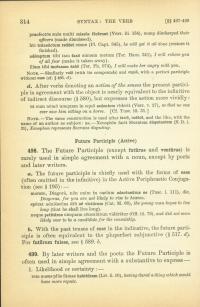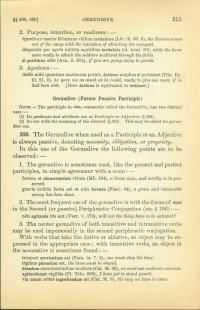498. The future participle (except futūrus and ventūrus) is rarely used in simple agreement with a noun, except by poets and later writers.
a. The future participle is chiefly used with the forms of esse (often omitted in the infinitive) in the active periphrastic conjugation (see § 195).
Morere, Diagorā, nōn enim in caelum adscēnsūrus es. (Tusc. 1.111)
Die, Diagoras, for you are not likely to rise to heaven.
Spērat adulēscēns diū sē vīctūrum. (Cat. M. 68)
The young man hopes to live long.
(that he shall live long)
neque petītūrus umquam cōnsulātum vidērētur (Off. 3.79)
And he did not seem likely ever to be a candidate for the consulship.
b. With the past tenses of esse in the indicative, the future participle is often equivalent to the pluperfect subjunctive (§ 517.d). For futūrum fuisse, see § 589.b.
499. By later writers and the poets the future participle is often used in simple agreement with a substantive to express—
- Likelihood or certainty.
rem ausus plūs fāmae habitūram (Liv. 2.10)
having dared a thing which would have more repute - Purpose, intention, or readiness.
ēgreditur castrīs Rōmānus vāllum invāsūrus. (Liv. 3.60.8)
The Roman comes out of the camp with the intention of attacking the rampart.Dispersōs per agrōs mīlitēs equitibus invāsūrīs (id. 31.36)
While the horse were ready to attack the soldiers scattered through the fields.sī peritūrus abīs (Aen. 2.675)
if you are going away to perish - Apodosis.
Dedit mihi quantum maximum potuit, datūrus amplius sī potuisset. (Plin. Ep. 3.21.6)
He gave me as much as he could, ready to give me more if he had been able.
[Here datūrus is equivalent to dedisset.]Note— The participle in -dus, commonly called the gerundive, has two distinct uses.
(1) Its predicate and attribute use as participle or adjective (§ 500).
(2) Its use with the meaning of the Gerund (§ 503). This may be called its gerundive use.


